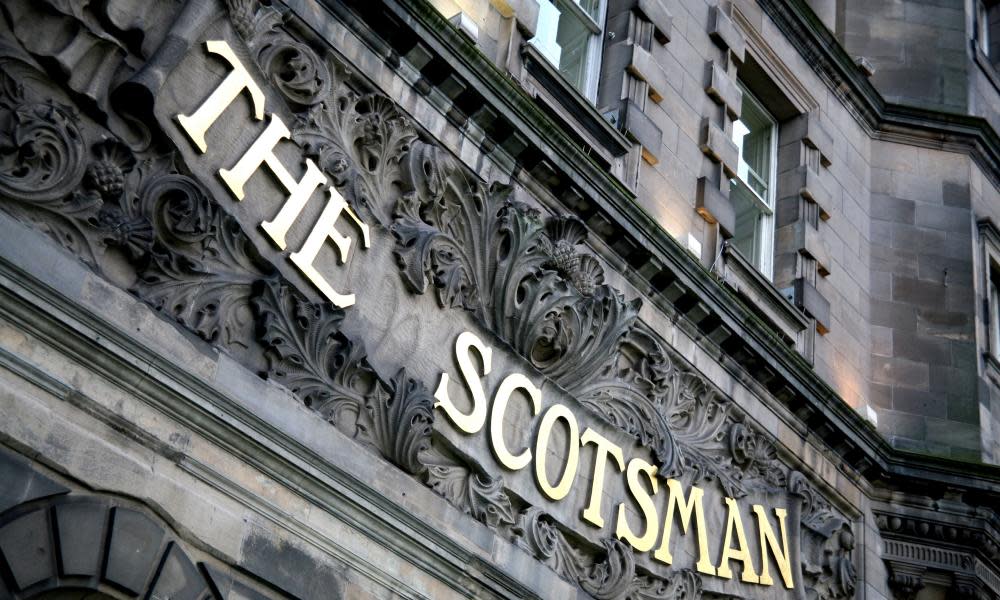We need the Scotsman more than ever, but who will safeguard its future?

Around 1840, a distinguished editor of the Scotsman called Charles Maclaren proved, with the help of an equally distinguished Swiss geologist called Louis Agassiz, that there had been an ice age in Scotland 10,000 years before, and that the country had been shaped and marked by something that, until then, people had not been aware of. It was a worldwide scoop, and its central piece of evidence was a vast, scarred rock on Blackford Hill in Edinburgh.
With the news that Scotland’s national newspaper, 200 years old last year, is up for sale in a job lot with hundreds of other Johnston Press titles, the metaphors lurking in that piece of Scotsman history are numerous. That vast, scarred rock redolent of meaning, fact, truth, analysis and history could be the Scotsman itself. The paper has punched above its weight internationally (it was a fervent supporter of African nationalism at a time when most other papers followed the government line on “mutiny and disobedience”) and has always been the voice of the Scottish centre, of Scottish culture and aspiration.
It is an unbearable paradox that at this Brexit moment, when the Scots look on in bemusement at the chaos in England, a Scottish medium with a great history and track record is being put up for sale with an as-yet-unknown price tag, unknown bidders and unknown liabilities. It’s not as if the country won’t need a national news medium that is honest, skilful and inclusive to help chart the coming years. It won’t necessarily need an asset on some global company’s balance sheet – the fate of too many news media.
People who have worked for the Scotsman – me included – tend to have a passionate love for it. In its glory days, overlooking Edinburgh at the top of North Bridge, its great thistle logo facing north to the Firth of Forth (obviously, the building is now a hotel), the paper employed people from across the world as writers, poets, political commentators.
It had started life in 1817 as an “incendiary” liberal paper opposed to the reactionary government of the day, and by and large it has kept that openness to other thoughts and opinions. I started writing for it as a student, getting the novels at the bottom of a distinguished literary pecking order to review in brief. The literary editor, Bill Watson, lived in a stately panelled office and kept publishers in a state of high alert for his interest, or not, in their wares.
The then editor, the great Eric B Mackay, was a granite-jawed deity of morose mien and incorruptible journalistic morals. He saw off government attempts to influence the Scotsman with adamantine regularity. Would he have been strong enough to face down the destructive drives of capitalist, aggregating global companies?
What will happen now to this great brand (as one commentator called it)? One Scottish financier interested in the paper despite its circulation now being about 20,000 says nothing can be decided until Johnston Press reveals details of what exactly it is selling.
The story of the buying and selling of the Scotsman, from the Barclay brothers’ asset-stripping purchase in 1995, is an intermittently unhappy one. The question now might be whether there is a group of people – Scots? – who want to see a new form of ownership for a great national paper (on a mutual, cooperative or Guardian trust model) and who can see a way forward in the digital age and negotiate with Johnston Press to see how it will sell the business – whether in parts or as a whole.
Edinburgh is still a rich city, said one former editor. But Brexit, he added, as with so much else, means that now might not be the time for vision and expenditure. So the fate of this great institution, summing up so much of the history of a people and with so much intelligent ability to deal with the present and the future, lies clouded in uncertainty.
The Scotsman has always punched above its weight. We need it more than ever and should ensure it is enabled to be what it truly could be – a strong national, independent, protected and nourished institution.
• Lindsay Mackie is a writer and partner in the NewWeather Institute, which examines social and economic alternatives to neoliberalism

 Yahoo News
Yahoo News 
